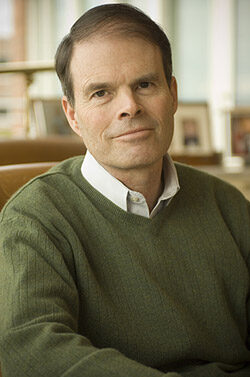Craig O. McCaw
Class of 1999
- CEO Eagle River, Inc.
- Chairman Pendrell Corporation

You get out of life what you put into it, not what you are given.
Craig McCaw, the second of four boys in his family, was born in 1949 in Centralia, Washington. When McCaw was four, he moved with his family to Seattle. He struggled from his earliest days in school; while in the third grade, he was diagnosed with dyslexia. With the help of tutoring, McCaw learned to compensate for his learning disability. He took this disability in stride and was determined to work harder than his classmates to prove he could succeed. Even so, upon entering a new school at of the age of 12, he was forced to repeat the seventh grade. By high school, his hard work began to pay off. He had a number of good teachers who had a lasting influence on him. With their help and his determination, he was able to catch up to his classmates academically.
At the age of 16, McCaw spent the summer living on his own in Centralia, selling cable television service door to door. That same summer, he learned how to fly airplanes. Businesses often hired him to fly their advertising banners around the area. McCaw attended Stanford University, where he majored in history. At the end of his freshman year, he returned home and worked long hours in his father's cable television business, but by summer's end, his father had suffered a fatal heart attack.
Shocked and grieving, McCaw and his family were unprepared when they discovered the turmoil of his father's business affairs. The debts and taxes that his father left behind were massive, and McCaw's mother had to liquidate all their holdings except for one cable service in Centralia. Because McCaw had the most experience with the cable business, it was decided that he would oversee the Centralia cable company. From his college dorm room at Stanford, he worked hard to deal with his grief and at the same time keep the family's only source of income solvent.
After earning a degree in history in 1973, McCaw returned to Seattle. He knew that to get the business going again, he needed to expand its customer base. He began buying small cable companies in remote areas, improving their programming, raising rates, and cutting costs. However, every transaction required that he borrow 100 percent of the funds needed to buy and fix the companies. He took a risk and used his original cable business and personal property as collateral. The strategy paid off, and McCaw quadrupled revenues, with the cash flow from operations growing eight-fold. A year later, in 1974, he started a car phone and pager company, which did well from the beginning.
By 1986, McCaw began to realize he would never make it big in the cable business. "There were already too many big companies in control," he says. Knowing he wanted to focus his attention on the cellular telephone industry instead, McCaw sold his cable business, which by then ranked 20th out of 1,000 companies nationwide. In 10 years, he had increased the customer base from 5,000 to 400,000.
Borrowing liberally, McCaw filed for his first cellular licenses in 1982, calling his company McCaw Cellular Communications. Quietly, he began buying the cellular divisions of large companies such as MCI, Western Union, and the Washington Post. Because of his heavy borrowing, it was a massive risk, but he succeeded in gradually building a national wireless network. In 1989, McCaw Cellular bought UN Broadcasting, which helped McCaw consolidate his system. When he sold his company to AT&T in 1994 for $11.5 billion, McCaw Communications was the largest cellular provider in the world.
It would be easy to say that McCaw was in the right place at the right time, but his success is more personal than that. "Being dyslexic has forced me to become highly intuitive," he says. "For me, I have to figure out the answer first and prove it later, rather than taking information and massaging it to an answer, which is the way most people arrive at decisions." McCaw could be described as a risk-taker, but he also believes that anything is possible. "You can achieve anything you want," he says, "but you have to be willing to pay the price."
Of his Horatio Alger Award, McCaw says, "Few people who excel in life do so without having experienced some adversity. It gives them determination. The Horatio Alger Association respects what is most important in life, which is that you get out of life what you put into it, not what you are given."
